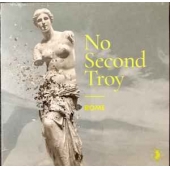
Rome
No Second Troy
Label: Trisol
Genre: Dark / Post Punk / Gothic / Neo-Folk
Availability
- 7" €17.99 Dispatched within 5-10 working days
Sturdy cardboard sleeve
Strictly limited to 500 copies
With ‘No Second Troy’ ROME return to deliver a machine-backed interpretation of the European blues and a song that is an obvious hit the minute you hear it.
The unlikely dose of electro twang in a darkly dancy number concocts a seductive yet subtle blast of blasphemy in the world of luxembourg-born singer-songwriter Jerome Reuter.
ROME are probably best known for creating near-pop hooks from chilly and ominous textures and wringing emotionally poignant choruses from the most sinister depths of the soul. ‘No Second Troy’ is much more forward in nature.
Mastermind Reuter again combines personal passion with his passion for mankind at large, in a song pointing to the contrast between the Homeric times when there was the beautiful city of Troy and the times of “an age like this” (Yeats) when there is no second Troy to be destroyed and burnt down.
Musically, however, the organising thrust is cleverly withheld until released for the bridge of the song, only to fall back into the marching suspense of the opening lines, a brilliant piece of dramatic manoeuvring:
From the port of Aberdeen down to Sicily
From holy Sintra on to Kyiv
We have searched the sky
For what might be some blessed reprieve
For a dream breaking into waking life
Written well over a year before Russia’s attack on Ukraine, the reference to Kyiv appears uncannily prescient. As a metaphor, Troy which was destroyed and burnt down at the end of a ten-year war, is certainly relevant in a time of conflict. The song’s title was obviously borrowed from William Butler Yeats’ poem about his very personal “Helen Of Troy”; a poem about unrequited love, rejection and blame.
ROME’s unique hybrid of melody and vulnerability aims to soothe a communal wound for the many listeners who found a spokesperson in the aching songwriting of Jerome Reuter. The purpose of civilisation, however, is not to provide bonfires for eternal or heroic beauty. Europe has burnt like Troy many times over and therefore it cannot not fail. However, one can’t help but wonder if ROME is that new Troy we should aspire to burn for; a symbol of nobility of a passed heroic age, attempting to set up an image to which the present might aspire.
